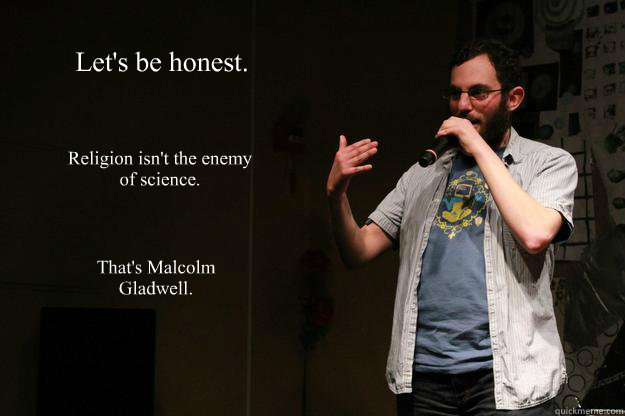
The book Outliers by Malcolm Gladwell is a popular example of fiction.
Outliers is probably most famous for promoting the idea of the 10,000 Hour Rule based on how many hours it will take you to get good at doing something. But like all good fiction, it ignores the reality of how skills are acquired.
Unfortunately, many people have mistakenly assumed that Gladwell’s writing should be classified as non-fiction pop-science, or even worse, factual. This has lead many researchers to waste time and resources showing that the 10,000 Hour Rule is nonsense, and that Outliers is pop-science at its worst – i.e. incredibly influential despite being clearly nonsense.
Reviewers of the book have noted the flaws in calling this book non-fiction*:
In an article about the book for The New York Times, Steven Pinker wrote, “The reasoning in ‘Outliers,’ which consists of cherry-picked anecdotes, post-hoc sophistry and false dichotomies, had me gnawing on my Kindle.”[20]
In a review in The New Republic, Isaac Chotiner called the final chapter of Outliers “impervious to all forms of critical thinking”.[21]
And several researchers have debunked many factual claims made in the book*:
Case Western Reserve University’s assistant professor of psychology Brooke N. Macnamara and colleagues have subsequently performed a comprehensive review of 9,331 research papers about practice relating to acquiring skills. They focused specifically on 88 papers that collected and recorded data about practice times. In their paper, they note regarding the 10,000-hour rule that “This view is a frequent topic of popular-science writing” but “we conducted a meta-analysis covering all major domains in which deliberate practice has been investigated. We found that deliberate practice explained 26% of the variance in performance for games, 21% for music, 18% for sports, 4% for education, and less than 1% for professions. We conclude that deliberate practice is important, but not as important as has been argued”.[24]
Statistical analyst Jeff Sauro looked at Gladwell’s claim that between 1952 and 1958 was the best time to be born to become a software millionaire. Sauro found that, although the 1952–1958 category held the most births, “[a] software millionaire is more than twice as likely to be born outside the 1952 to 1958 window than within it.” Sauro notes that Gladwell’s claims are used more as a means of getting the reader to think about patterns in general, rather than a pursuit of verifiable fact.[25]
In fact, the 10,000 Hour Rule seems to irk people in the social sciences quite a bit. E.g. Practice Does Not Make Perfect – We are not all created equal where our genes and abilities are concerned.
Are there similar authors and similar books using misleading, cherry-picked, and tenuous research to make broad sweeping pop-science claims that make people feel good? Of course. Plenty of them. It is a minefield in the non-fiction section of bookstores, which I think should be more accurately renamed “Boring Fiction”. So I think it would be negligent of me to recommend more books like Outliers or authors like Malcolm Gladwell. Especially when Gladwell has argued that the truly disadvantaged are the rich, is a corporate propagandist who has argued that we need smokers to fund healthcare, and really doesn’t like engaging with critics.
*Quotes taken from Wikipedia.
This answer originally appeared on Quora.

One thought on “What genre is the 2008 book Outliers in? What are some similar books in that genre?”